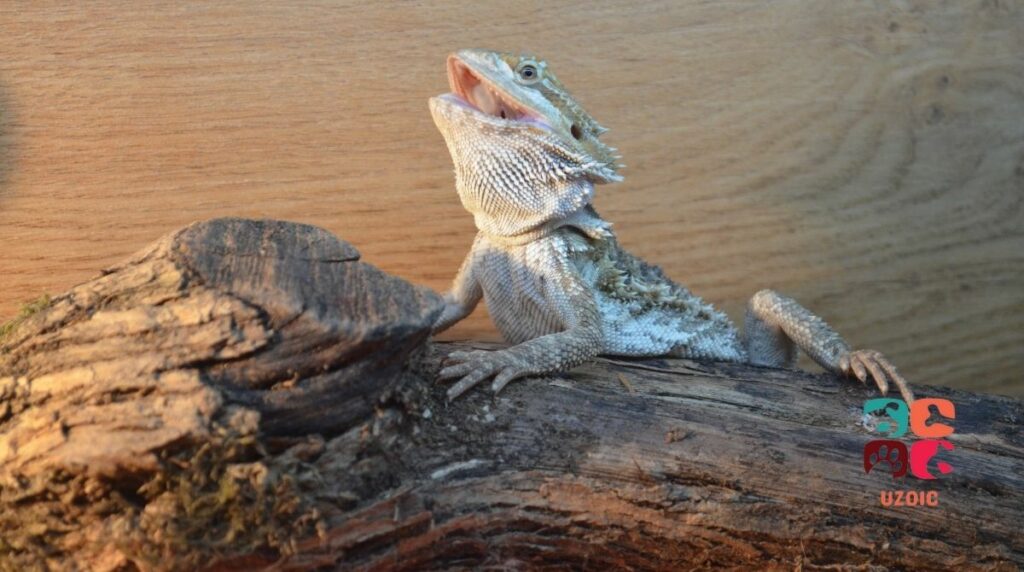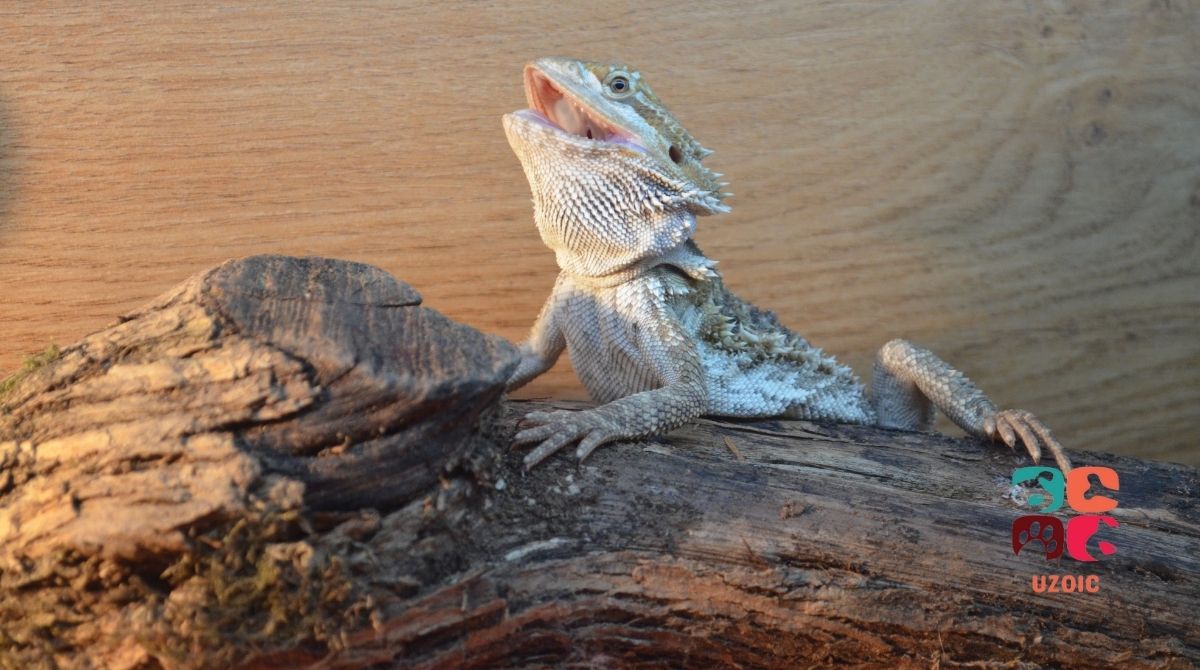If you’ve ever seen your Bearded Dragon blowing bubbles, you may be wondering what’s going on. Bearded Dragons blow bubbles for various reasons, and it’s important to know the causes and solutions to keep your Bearded Dragon healthy and happy! Bearded dragons are a type of lizard that is native to Australia. These lizards get their name from the spines on their chin, which resemble a beard. Bearded dragons are popular pets because they are relatively low-maintenance and can be easy to care for. However, one thing that pet owners may notice is that their bearded dragon will sometimes blow bubbles.
While it may look cute, Bearded Dragons blowing bubbles signifies that something is wrong. Bearded Dragons blow bubbles when they are stressed, anxious, or sick. In some cases, Bearded Dragons may also blow bubbles because of a respiratory infection. So if you see your Bearded Dragon blowing bubbles, it’s important to take action and figure out the cause.
Table of Contents
What Causes Bearded Dragons To Blow Bubbles?

There are a few reasons why your Bearded Dragon may be blowing bubbles.
Stress
One possibility is that your Bearded Dragon is stressed. Bearded Dragons can get stressed for various reasons, such as being handled too much, not having enough space, or being afraid of loud noises. If you think that stress may cause your Bearded Dragon’s bubbles, try to create a calm environment for your pet. This may include handling your Bearded Dragon less, moving him to a quiet room, or using calming music.
Anxiety
Another possibility is that your Bearded Dragon is anxious. Bearded Dragons can get anxious for the same reasons that they get stressed. If you think that anxiety may cause your Bearded Dragon’s bubbles, try to create a calm environment for your pet. This may include handling your Bearded Dragon less, moving him to a quiet room, or using calming music.
Infection and Acid Reflux
In some cases, Bearded Dragons blow bubbles because they are sick. For example, bearded Dragons can get a respiratory infection, which is the reptilian equivalent of a cold. If your Bearded Dragon has a respiratory infection, he may have fluid coming out of his nose or mouth. In addition to blowing bubbles, Bearded Dragons with a respiratory infection may also have trouble breathing, be lethargic, and lose appetite.
A respiratory infection is a common cause of respiratory distress in reptiles, and it can cause the bearded dragon to produce excess mucus. This mucus can then collect in the respiratory tract and be expelled as bubbles.
On the other hand, reflux is a condition in which stomach acid regurgitates back up into the throat. This can also cause the bearded dragon to produce excess mucus, which can be blown out as bubbles.
If your bearded dragon is blowing bubbles, it is important to take them to a vet for a proper diagnosis and treatment.
How Can I Prevent My Bearded Dragon From Blowing Bubbles?
There are a few things that you can do to prevent your Bearded Dragon from blowing bubbles.
Environment
One thing that you can do is to create a calm environment for your pet. This may include handling your Bearded Dragon less, moving him to a quiet room, or using calming music.
Habitat
Another thing that you can do is to make sure that your Bearded Dragon has a clean and comfortable habitat. Bearded Dragons need a habitat with plenty of space to move around and explore. In addition, the habitat should have hiding spots for your Bearded Dragon to feel safe and secure.
Finally, you can try to prevent respiratory infections by keeping your Bearded Dragon’s habitat clean and dry. Bearded Dragons are susceptible to respiratory infections if their habitat is too wet or humid. To prevent this, make sure that you keep the humidity in your Bearded Dragon’s habitat low. You can do this by using a dehumidifier or by providing your Bearded Dragon with a dry hide.
If you follow these tips, you can help prevent your Bearded Dragon from blowing bubbles.
How do you know if your bearded dragon is unhealthy?
If your bearded dragon is unhealthy, there are several signs you may notice. He may puff up and breathe heavily after eating or have a hard time either with his digestive system or breathing. He may also be distressed or scared and have excessive saliva in his mouth. The sides of his mouth may flare, and there may be bubbles forming around the mouth area. If you notice any of these signs, it’s important to take your bearded dragon to the vet as soon as possible so he can receive the treatment he needs.
How Can You Treat A Bearded Dragon Blowing Bubbles?
If your bearded dragon is blowing bubbles, it could be a sign that something is wrong with its enclosure. Check the temperature and humidity levels to ensure they are within your lizard’s ideal range. NCSU recommends keeping the humidity levels between 20 and 40%. If everything looks fine, then the bubbles might just be a harmless case of bearded dragon burping. You can give it some good quality digestive aid / antacid to help ease the reflux.
However, if your pet starts to breathe rapidly or has trouble moving, runny nose, or excess mucus, it could be suffering from respiratory distress, and you should take it to the vet.
Treatment options in case of respiratory infection in Bearded Dragons
- Nebulizer treatments
- Cefz can also be used as a broad-spectrum antibiotic
- Acidophiliz
- Antepsin
- Iodine/Betadine – dilute it down to clean out the mouth
In most cases, your veterinarian should be able to provide you with the correct course of treatment for your Bearded Dragon.
Should You Worry About Bearded Dragon Blowing Bubbles?
Generally, there is no cause for alarm unless you suspect that it’s a case of respiratory infection. Always consult with a vet to rule out health problems. If your bearded dragon is blowing bubbles due to a respiratory tract infection, the vet will give some antibiotics. If the case is of reflux, the vet will give some antacids as shared above, to ease the Bearded Dragon’s discomfort.
Some users suggest that when your beardie blows bubbles, it’s releasing stress and expressing contentment. While it may be true for many cases, look out for symptoms related to flu, tardiness, and any gastric issues that your bearded dragon might be having. On the other hand, if everything seems fine, your Bearded Dragon is probably just expressing relief after a good meal or long bath!
Conclusion
As a pet owner, it’s important to watch your Bearded Dragon and know when something isn’t quite right. Bearded Dragons are prone to various health problems, so it’s important to be aware of the signs and symptoms. If you see your Bearded Dragon blowing bubbles, don’t hesitate to take them to the vet for a check-up. With proper care and treatment, your Bearded Dragon will be back to its happy and healthy self!
Also read:


